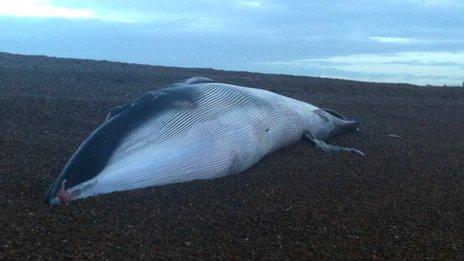Beached Suffolk fin whale 'could be used for biofuel'
- Published

The fin whale is due to be removed from Shingle Street on Thursday
A whale which died on a Suffolk beach is due to be moved on Thursday and its body may be used to help make biofuel.
The fin whale, about 10m (33ft) long and weighing about eight tonnes, washed up at Shingle Street on Sunday.
Suffolk Coastal District Council said the carcass would be taken to be rendered, with the output probably used for biofuel.
Councillor Andrew Nunn said the whale would be "reused, rather than put into landfill, or towed out to sea to rot".
The young whale is believed to have been alive for a short time on land before it perished.
'Logistical nightmare'
The Zoological Society of London (ZSL) was unable to perform a post-mortem examination on the carcass on Tuesday, due to the tide.
Rob Deaville, manager of the cetacean stranding investigation programme for ZSL, said he was still able to take measurements and samples.
"That will give us some information about the animal but just not the detail of information we would have got from a post-mortem," he said.
"These things are logistical nightmares and I have a lot of sympathy with the local authorities with what they can and can't do."
The council has moved the whale slightly so it is in a better position to be taken away by digger on Thursday morning.
- Published1 October 2012
- Published1 October 2012
- Published28 August 2012
- Published13 August 2012
- Published5 October 2011